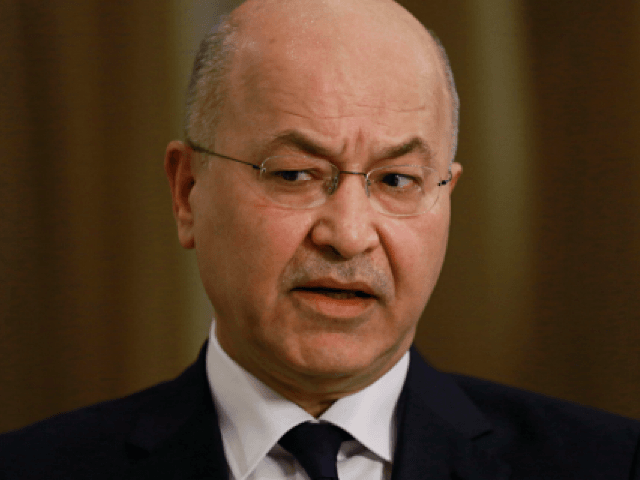Iraqi President Barham Salih told the 2020 U.N. General Assembly on Wednesday that his country is struggling to recover from the coronavirus pandemic, which struck Iraq after years of difficult and expensive struggles with extremism, terrorism, and corruption, at a moment when falling oil prices were cutting into the nation’s income.
Like many other speakers at the General Assembly, Salih spoke of the coronavirus pandemic as a global threat which highlighted the need for international cooperation, information-sharing, and developed countries assisting those in need. He called for advance planning to ensure “equity in the distribution of a vaccine, when a vaccine becomes available,” instead of allowing its distribution to become “a purely commercial and mercantile act.”
“We have limited resources in terms of health care, and our health care infrastructure is weak, so our fight is rendered all the more complex,” he said of Iraq’s experience with the coronavirus.
Salih said the pandemic arrived in Iraq while it was still recovering from the difficult battle against the Islamic State, defeated thanks to cooperation among various Iraqi forces and “the international coalition and the support of our neighbors.” He warned that the threat of transnational terrorism still lurked in sleeper cells scattered across Iraq, including its remote desert regions.
Acknowledging that corruption is a severe problem for his country’s government, Salih tried to reverse conventional financial analysis by arguing that instead of waiting for the Iraqi government to get cleaner before making investments and rendering financial assistance, the international community should pour funding into Iraq now, allowing his administration to “dry up the sources of financing for lawless organizations and extremism” and attempt to recover “pillaged capital.”
“The Iraqi people are deeply bitter when it comes to the impact of corruption. They are angry at the scourge,” he said.
Salih called on the United Nations to address the “crime of genocide” and the “massacre of the Yazidi people in Iraq” by ISIS. He asked the international community to “stand shoulder-to-shoulder with Iraq to ensure that such crimes can never be committed again.”
Salih cited the plunge in world oil prices as a major factor in Iraq’s perilous economic situation, which in turn was a contributing factor to popular unrest. He assured the United Nations that his government has heard the demands of protesting citizens and is attempting to implement the reforms they called for. He also promised that free and fair elections would be held on schedule next year, in cooperation with U.N. election officials.
“Measures already underway are demonstrating that peaceful change is entirely possible within a constitutional framework,” he said. “Violence is not necessary. Indeed, such peaceful change is that which Iraqis wish to see.”
Salih touched upon the Sunni-Shiite divide in Iraq with some delicacy, stressing that Iraq’s top Shiite cleric, Grand Ayatollah Ali al-Sistani, agrees with him about the need for systemic reform to address corruption. He did not criticize the Iran-backed Shiite militia forces in Iraq directly, but he listed “anarchists” as one of the adversaries his government faces and stressed that he does not want Iraq to become a “playground for other forces which will kill themselves on our territory.”
“We have witnessed enough wars, and enough attacks on our sovereignty,” he said. “An independent Iraq, a sovereign Iraq, is a country in which all interests of all citizens can be protected. It is a state which will be able to protect the region, guarantee economic cooperation between all members, and fight against terrorism and extremism.”

COMMENTS
Please let us know if you're having issues with commenting.